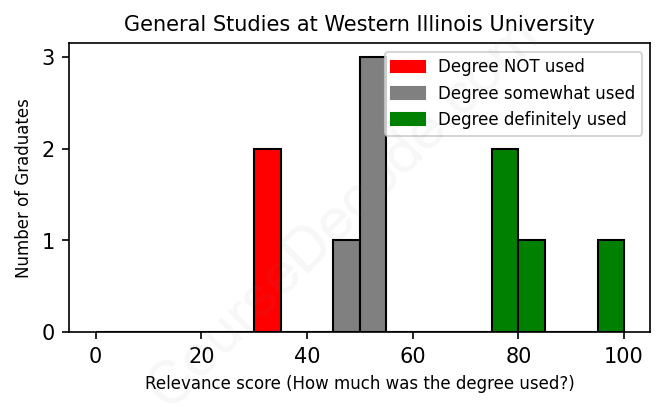
First, some facts. Of the General Studies graduates from Western Illinois University we've analyzed , here's how many have used (or NOT used) their degree in their career:

These are estimates based on AI analysis of 10 LinkedIn profiles (see below).
The verdict? Below average. Overall, with an average relevance score of 59%, General Studies graduates from Western Illinois University have a lower likelihood (-8%) of finding work in this field compared to the average graduate across all fields:
And for comparison, here's the chart for all profiles we've looked at across all degrees.
Also, after graduating, 40% of these graduates have pursued further education other than another Bachelor's degree (such as a Masters degree or other), compared to the average across all profiles of 35%. This suggests you may need more than just a Bachelors degree to be competitive as a General Studies graduate.
See the details:
|
Relevance score: 50% We think this person has gone into a career only somewhat relevant to their degree. We think this person has gone into a career only somewhat relevant to their degree.
DEGREE INFOGraduated in 2016 from Western Illinois University with a Bachelor's degree in General Studies. No other secondary education since. JOB HISTORY SINCE GRADUATIONPersonal Trainer XSport Fitness Sep 2016 - Sep 2017 Bartender / Server  Beerhead Bar & Eatery Sep 2017 - Aug 2020 Claims Coordinator  Assurance, a Marsh & McLennan Agency LLC company Dec 2019 - Oct 2021 Screenwriter  Freelance Aug 2020 - Present Development Coordinator  The Enclave Entertainment Group Sep 2020 - Present Floater  Anonymous Content Oct 2021 - Present ABOUTA screenwriter with a Bachelor's degree in General Studies, with an emphasis in Criminal Justice from Western Illinois University. [NAME REMOVED] carries a fundamental belief that story is the greatest way to find meaning and share the human experience. |
The top 10 most common jobs done by the graduates we've analyzed (ranked most common to least) are:
After looking at the job history of folks who graduated with a General Studies degree from Western Illinois University, it seems like there's a pretty mixed bag of careers they’ve gone into. A lot of them have found their way into education-related roles, like substitute teachers and actual teaching positions, which totally makes sense because General Studies often includes a hefty chunk of educational theory and communication skills. Other common jobs include positions in management, particularly in the restaurant industry or customer service, where skills like organization and interpersonal communication come into play. It’s interesting to see how people have carved out different paths.
However, when it comes to how relevant these jobs are to their General Studies degree, the picture is a bit cloudy. While some roles, especially in teaching and educational policy, closely align with what they studied, many others—like restaurant management or customer service—don’t really tap into the specific knowledge they gained during their studies. These jobs often focus more on general skills rather than specialized knowledge. So, in the grand scheme of things, you could say that there’s a mix of relevance. Some graduates have definitely leveraged their degree in meaningful ways, while others seem to be using it as a stepping stone into more general skillsets rather than applying the specific knowledge from their degree directly into their careers.
Here is a visual representation of the most common words in job titles for General Studies graduates (this is across all General Studies graduates we've analyzed, not just those who went to Western Illinois University):

It looks like graduates from the General Studies program at Western Illinois University have taken on a variety of positions right after graduation, which is pretty common for folks in this field. Many of them seem to land their first jobs in roles that emphasize adaptability and interpersonal skills, such as substitute teachers, restaurant managers, and customer service representatives. For example, one graduate became a Senior Quotation Analyst right after graduation and then moved into a more specialized role, which speaks to the flexibility and broad knowledge gained from a General Studies degree. Others have dipped their toes into education or the service industry, which often attracts graduates who may not have a specific career path yet but want to gain some experience while figuring things out.
As for what these graduates are doing five or ten years later, many have transitioned into more focused roles and have climbed the career ladder. A notable number of them have landed positions related to education and legislative affairs, indicating that they’ve found their niche within their broader studies. For instance, one graduate who started out as a Program Specialist made a remarkable journey to become the Director of Governmental Relations at a major educational organization. However, some have also drifted into positions that seem less connected to their degree, like serving or bartending, which can be typical for graduates still exploring their options. Overall, while there’s a mix of related and unrelated careers, many graduates seem to have found a way to channel their diverse education into roles that suit their evolving interests. It's a journey, and it’s great to see how different people carve out paths that resonate with them!
Getting a Bachelor’s degree in General Studies at Western Illinois University isn’t typically considered one of the hardest paths you can take. It’s designed to offer a pretty flexible curriculum, allowing you to explore a variety of subjects rather than diving deep into a specific major. It can definitely feel easier than more focused degrees, especially if you enjoy a range of topics and don’t mind a more laid-back approach to coursework. Of course, like any degree, you’ll still need to keep up with assignments and study, but if you're someone who thrives on variety and likes to learn a bit about everything, you might find it less stressful compared to more demanding degrees. So overall, it tends to be on the easier side, especially for students who are motivated and organized!
Most commonly, in the LinkedIn profiles we've looked at, it takes people 2 years to finish a Bachelor degree in General Studies.
So, looking at these Western Illinois University grads and their job paths, it seems like they've got a pretty mixed bag when it comes to earnings. The ones who went into teaching and education, like the substitute teachers and coordinators at state boards, probably aren’t raking it in, especially compared to others in more corporate roles or specialized positions. On the flip side, those in management at places like Cooper's Hawk and CVS Health likely pulled in decent salaries, especially as store and restaurant managers. The latest grads, especially the enrollment advisor and claims coordinator, seem to be starting off on stable ground, but it might take some time for them to really upscale their earnings. Overall, it looks like they’re doing okay, just not all of them are striking it rich right out of the gate.
Here is a visual representation of the most common words seen in the "about" section of LinkedIn profiles who have a Bachelor degree in General Studies (this is across all General Studies graduates we've analyzed, not just those who went to Western Illinois University). This may or may not be useful:

Here are all colleges offering a Bachelor degree in General Studies (ordered by the average relevance score of their General Studies graduates, best to worst) where we have analyzed at least 10 of their graduates:
| College | Score | Count |
|---|---|---|
 Southeastern Louisiana University Southeastern Louisiana University
|
69 | 10 |
 University of Louisiana at Lafayette University of Louisiana at Lafayette
|
62 | 16 |
 Western Illinois University Western Illinois University
|
59 | 10 |
 Eastern Illinois University Eastern Illinois University
|
59 | 12 |
 University of North Texas University of North Texas
|
58 | 14 |
 Eastern Kentucky University Eastern Kentucky University
|
57 | 13 |
 University of Central Oklahoma University of Central Oklahoma
|
55 | 15 |
 Texas Woman's University Texas Woman's University
|
53 | 10 |
 Southern New Hampshire University Southern New Hampshire University
|
52 | 17 |
 Columbia College Columbia College
|
45 | 18 |
 Ball State University Ball State University
|
34 | 11 |